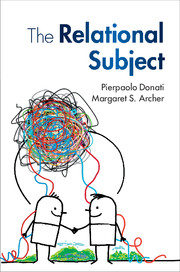Book contents
- Frontmatter
- Dedication
- Contents
- List of figures
- Acknowledgements
- Part I
- Part II
- Prologue: The sources of Relational Subjects and their resources
- 3 The Relational Subject and the person: self, agent, and actor
- 4 Socialization as Relational Reflexivity
- 5 Cultural reproaches to Relationist Sociology
- Part III
- Index
3 - The Relational Subject and the person: self, agent, and actor
from Part II
Published online by Cambridge University Press: 05 July 2015
- Frontmatter
- Dedication
- Contents
- List of figures
- Acknowledgements
- Part I
- Part II
- Prologue: The sources of Relational Subjects and their resources
- 3 The Relational Subject and the person: self, agent, and actor
- 4 Socialization as Relational Reflexivity
- 5 Cultural reproaches to Relationist Sociology
- Part III
- Index
Summary
No sociology can do without a concept of the human person. Even various forms of determinism or those who most determinedly pronounced the ‘death of the subject’ have such concepts: humans are taken to be fully malleable, mutable, and mouldable by ‘social forces’. Those who view them as träger or fully permeable membranes simply conceptualize them in this way. This chapter deals with the different conceptions of personhood (usually) endorsed and advocated by some who call themselves ‘Relational Sociologists’ and those calling themselves ‘Social Realists’. In my view, these two approaches are complementary and can work in synergy; otherwise this book could not have been written.
In both approaches, ‘personhood’ is intended to cover the full gamut of concepts regularly used in social theory: ‘selves’, ‘agents/agency’ and ‘actors’. In other words, the ‘person’ stands for the full human being. The generic dispute in social theory is about the balance of properties and powers that should be accorded to the ‘social’ rather than to the ‘individual’. Both Realists and Relationalists are rather touchy about the term ‘individual’ because it is viewed as contaminated by its place in the history of thought and its association with neo-liberalism and ‘individualism’. Relationists prefer to talk about ‘selves’, or ‘persons as powerful particulars’ (Rom Harré); Realists about people in their ‘concrete singularity’ (Roy Bhaskar). In themselves these terminologi- cal differences are not important and I will try to respect this shared squeamishness by not using the noxious term ‘individual’.
What is important is whether or not our singular selves are credited with their own properties and powers – potentialities, liabilities, capabilities, creativity, suffering, intentionality, and reflexivity inter alia – and where and how these are held to originate. At first glance, Relationalists and Realists appear to give the same answer. These originate from our human embodied constitution and life in the real world with which we necessarily have to interact in order to survive and, better, thrive.
- Type
- Chapter
- Information
- The Relational Subject , pp. 85 - 122Publisher: Cambridge University PressPrint publication year: 2015
- 8
- Cited by

